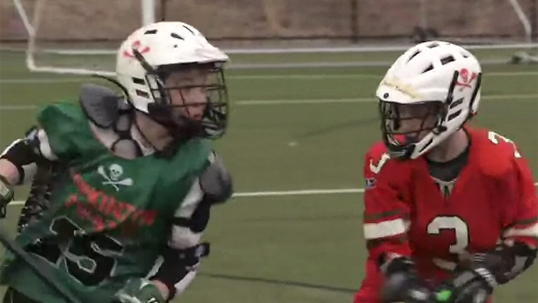
Two of Brian Busconi's Hopkinton youth lacrosse players in action. Busconi counsels awareness of the dangers of sports concussions.
With student athletes taking to local playing fields in droves this spring and awareness of the dangers of youth sports and head injuries heightening nationwide, sports medicine expert Brian Busconi, MD, is urging parents, coaches and trainers to be vigilant for signs of possible concussion.
“Concussions in young athletes have more detrimental effects than they do in mature adults,” said Dr. Busconi, associate professor of orthopedics & physical rehabilitation, family medicine & community health and pediatricsl, and director of sports medicine at UMass Memorial Medical Center. “It’s important to recognize that if they’ve had a head event. That’s why we need to make everyone aware.”
A father of two and a youth lacrosse coach, Busconi applauds recent guidelines from the American Academy of Neurology on the evaluation and management of concussion in sports. And he is proud that the guidelines follow on the heels of the earlier Massachusetts law, passed in 2010, that set statewide standards for what do to when concussion is suspected in interscholastic sports. Busconi was asked to provide input for the law. “The important thing is to not put kids in a position where they could have another head trauma while still recovering from one,” he emphasized.
Central to both the American Academy of Neurology guidelines and the Massachusetts law is the recommendation that any athlete suspected of having sustained a concussion should immediately be removed from play to minimize the risk of further injury, and should not be permitted to return to play until he or she has been assessed by an experienced health care professional.
“The Massachusetts ruling brought together the trainers, the coaches, the parents and the kids themselves so that all of us are together in understanding what to do when you have a concussion,” Busconi noted. “We were truly on the forefront of recognizing that everyone on every level needed to be educated about concussion to help create awareness, and beginning to standardize how we take care of an athlete with a head injury.”
So what should parents, coaches and kids look for? Headache, forgetfulness, sleepiness, nausea, vomiting, loss of appetite, sensitivity to light, difficulty concentrating, even personality changes can all be signs of concussion according to Busconi.
“I’ve never felt or heard criticism for overreacting. The problem with concussions is us underreacting about it,” he concluded. “If you’re worried, take them to a professional to be evaluated, especially if symptoms get worse.”
Learn more in this Expert’s Corner video.